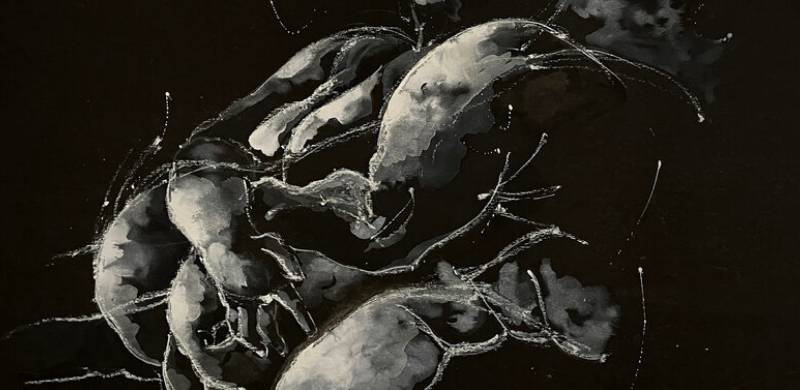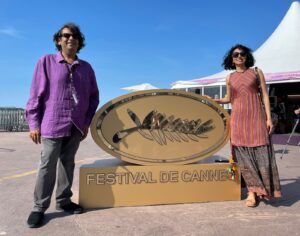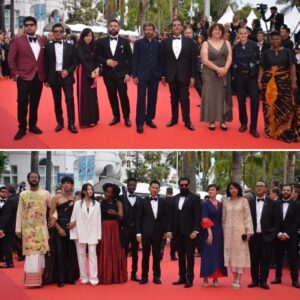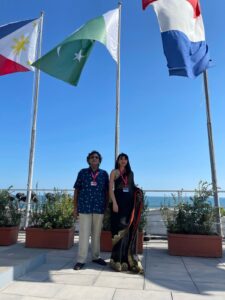
Pakistani films might be struggling to find their footing at home, but they stand tall and proud abroad. If anything can serve as proof for that, it's the 2022 Cannes Film Festival. Writer Saim Sadiq's directorial debut film Joyland became Cannes’ first official Pakistani entry, winning the jury prize at Un Certain Regard.
In all the well-deserved praise for the monumental and historic win, the fact that a second Pakistani director won big at the world's most prestigious film festival can seem too good to be true. And yet, because of Seemab Gul's 'Haven of Hope', it’s not.
Haven of Hope isn't a film...yet. It's one of the ten screenplays chosen by La Fabrique Cinéma de l'Institut français, a tailored program that promotes filmmakers from emerging countries and allows them to attend and interact with French producers at Cannes. As if that wasn't enough, the project also won the Rotterdam’s Hubert Bals Fund Script and Project Development Support, which gave it a financial lifeline, and will be the first Pakistani feature film to apply for the competitive Cinema Du Monde funding as well.
Seemab is both the writer and the director for the film, which will be produced by Sanat Initiative’s Abid Aziz Merchant. The two have worked together before, and ended up making a short film called Sandstorm, that was officially selected for the Venice Film Festival in 2021, and Sundance in 2022. Clearly, the two have made some magic before, and now they’re at it again with the emotionally rife Haven of Hope.

The fictional story revolves around three Pakistani women who have been left at a women’s asylum – Panah Khana – by their families, who have effectively abandoned them. The film is an imagining of what would happen if the women ventured out and confronted their families.
In 2011, Seemab was working as a field producer and interpreter on Amélie Saillez’s documentary about the safe houses run by humanitarian Abdus Sattar Edhi and his wife Bilquis Edhi, called ‘The Kingdom of Mister Edhi’.
During her time working on the documentary, she says she was struck by the resilience and strength of the women she met and couldn’t quite get them out of her head. While the idea for the screenplay had been brewing in her mind for a while, the actual script was written last summer, after which Seemab applied to the Venice Biennale College Cinema, which selects and develops nine microfilm projects, three of which get produced by Venice as well.
Haven of Hope isn’t a micro-project. It has three protagonists, hundreds of extras, and multiple shooting locations. Too ambitious an undertaking for Venice, it went through many film labs in Europe, and ultimately, La Fabrique, which is more of a program than a lab according to Seemab, took the project in.

Through La Fabrique, and the Cinema Du Monde CNC funding, Haven of Hope was able to enter advanced production, and is now at the financing stage, which is where the opportunity to be present at Cannes became a game changer. La Fabrique gives the filmmakers access to French producers who can then help fund the films. But Seemab says it isn’t all about finances.
Bringing Pakistani cinema to an int'l stage
“The reason I’m going to these different festivals and labs is because it’s all about visibility,” Seemab tells me. “It’s about bringing Pakistani cinema to an international stage and audience.”
She presents a hypothetical case: if she were to find an investor herself, without festivals like Cannes and Venice and Sundance backing her up, there would be no guarantee that the film could gain the kind of recognition it gets through these festivals. “It’s about visibility, distribution, market sales, prospects. These platforms are bringing in all those things,” she says.
For the seemingly ever-nascent Pakistani film industry, visibility and financing are extremely important. Every couple of years, a new film is heralded as the harbinger of film revival in Pakistan. And yet somehow, that revival never really seems to come about. It’s not entirely due to a lack of financing either. As Seemab points out, the TV industry is very healthy and thriving, and there’s clearly some money, because we keep getting television films clustered around Eid every year.
“It’s not that we don’t have talent either. It’s just that the kind of films being consumed and looked to for inspiration are mostly big budget Bollywood and Hollywood films, that have a very different cinematic language,” says Seemab, who is a big advocate of exploring world cinema. But for those interested in making arthouse films, a lot of that budgeting is out of reach.
While international film festivals provide Pakistani independent filmmakers with a chance to acquire funding, there are drawbacks to seeking financing abroad, instead of your home country.
Haven of Hope’s producer, Abid Aziz Merchant tells Friday Times that the cost of production goes up when you’re working on a foreign grant, because you end up having to spend a portion of that grant in their country. “Of course, the cost of production and post-production are going to be more affordable in your own country, so in that sense, the cost of filmmaking abroad is higher too,” he says.

Censorship of the arts in Pakistan
Of course, even if a film was to miraculously get financial backing, the question of its viability in Pakistan is unpredictable, as Abid knows all too well. In March 2022, I’ll Meet You There, a movie that he produced, was set to be released in theaters all over Pakistan. The Sindh film board passed the film without any issues or cuts, and then it was sent to the Central Board of Film Censors (CBFC), which banned the film two days before its theatrical release. Abid says he could have taken up legal battles to get the film released, but ultimately, like so many filmmakers in the country, he decided to cut his losses and focus on the next one.
And he seems pretty hopeful for someone who has lived through the Russian roulette that the CBFC likes to play. He’s already been working on two new projects since I’ll Meet You There, one of them being Haven of Hope, which will be his fourth feature film.
Abid has also enjoyed a fair bit of prestige at some of the world’s best film festivals, from South By So West, to Sundance. When I asked him about if the Pakistani film industry can be discouraging, he said the reason it seems more discouraging is because of the lack of funding opportunities. If not the governments, then at least corporations should step up and consider funding the arts as a part of their CSR initiatives, he says.
But both Seemab and Abid are united in their desire to avoid interference at the hands of their investors, which is why they are satisfied with the funding provided by festivals. They are both firm believers in creative autonomy and are convinced that they don’t want to produce a soft-drink advertisement in the guise of a movie, as happens all too often in Pakistani mainstream cinema.
Seemab excitedly tells Friday Times how this year was the first time Cannes had a proper Pakistani contingent, and it felt good to have so many brilliant members of the film fraternity around.
“Hopefully there will be more opportunities, and this will open doors for other film makers. Who knows, maybe we’ll start our own Pakistani film movement or wave."
In all the well-deserved praise for the monumental and historic win, the fact that a second Pakistani director won big at the world's most prestigious film festival can seem too good to be true. And yet, because of Seemab Gul's 'Haven of Hope', it’s not.
Haven of Hope isn't a film...yet. It's one of the ten screenplays chosen by La Fabrique Cinéma de l'Institut français, a tailored program that promotes filmmakers from emerging countries and allows them to attend and interact with French producers at Cannes. As if that wasn't enough, the project also won the Rotterdam’s Hubert Bals Fund Script and Project Development Support, which gave it a financial lifeline, and will be the first Pakistani feature film to apply for the competitive Cinema Du Monde funding as well.
Seemab is both the writer and the director for the film, which will be produced by Sanat Initiative’s Abid Aziz Merchant. The two have worked together before, and ended up making a short film called Sandstorm, that was officially selected for the Venice Film Festival in 2021, and Sundance in 2022. Clearly, the two have made some magic before, and now they’re at it again with the emotionally rife Haven of Hope.

The fictional story revolves around three Pakistani women who have been left at a women’s asylum – Panah Khana – by their families, who have effectively abandoned them. The film is an imagining of what would happen if the women ventured out and confronted their families.
In 2011, Seemab was working as a field producer and interpreter on Amélie Saillez’s documentary about the safe houses run by humanitarian Abdus Sattar Edhi and his wife Bilquis Edhi, called ‘The Kingdom of Mister Edhi’.
During her time working on the documentary, she says she was struck by the resilience and strength of the women she met and couldn’t quite get them out of her head. While the idea for the screenplay had been brewing in her mind for a while, the actual script was written last summer, after which Seemab applied to the Venice Biennale College Cinema, which selects and develops nine microfilm projects, three of which get produced by Venice as well.
Haven of Hope isn’t a micro-project. It has three protagonists, hundreds of extras, and multiple shooting locations. Too ambitious an undertaking for Venice, it went through many film labs in Europe, and ultimately, La Fabrique, which is more of a program than a lab according to Seemab, took the project in.

Through La Fabrique, and the Cinema Du Monde CNC funding, Haven of Hope was able to enter advanced production, and is now at the financing stage, which is where the opportunity to be present at Cannes became a game changer. La Fabrique gives the filmmakers access to French producers who can then help fund the films. But Seemab says it isn’t all about finances.
Bringing Pakistani cinema to an int'l stage
“The reason I’m going to these different festivals and labs is because it’s all about visibility,” Seemab tells me. “It’s about bringing Pakistani cinema to an international stage and audience.”
She presents a hypothetical case: if she were to find an investor herself, without festivals like Cannes and Venice and Sundance backing her up, there would be no guarantee that the film could gain the kind of recognition it gets through these festivals. “It’s about visibility, distribution, market sales, prospects. These platforms are bringing in all those things,” she says.
For the seemingly ever-nascent Pakistani film industry, visibility and financing are extremely important. Every couple of years, a new film is heralded as the harbinger of film revival in Pakistan. And yet somehow, that revival never really seems to come about. It’s not entirely due to a lack of financing either. As Seemab points out, the TV industry is very healthy and thriving, and there’s clearly some money, because we keep getting television films clustered around Eid every year.
“It’s not that we don’t have talent either. It’s just that the kind of films being consumed and looked to for inspiration are mostly big budget Bollywood and Hollywood films, that have a very different cinematic language,” says Seemab, who is a big advocate of exploring world cinema. But for those interested in making arthouse films, a lot of that budgeting is out of reach.
While international film festivals provide Pakistani independent filmmakers with a chance to acquire funding, there are drawbacks to seeking financing abroad, instead of your home country.
Haven of Hope’s producer, Abid Aziz Merchant tells Friday Times that the cost of production goes up when you’re working on a foreign grant, because you end up having to spend a portion of that grant in their country. “Of course, the cost of production and post-production are going to be more affordable in your own country, so in that sense, the cost of filmmaking abroad is higher too,” he says.

Censorship of the arts in Pakistan
Of course, even if a film was to miraculously get financial backing, the question of its viability in Pakistan is unpredictable, as Abid knows all too well. In March 2022, I’ll Meet You There, a movie that he produced, was set to be released in theaters all over Pakistan. The Sindh film board passed the film without any issues or cuts, and then it was sent to the Central Board of Film Censors (CBFC), which banned the film two days before its theatrical release. Abid says he could have taken up legal battles to get the film released, but ultimately, like so many filmmakers in the country, he decided to cut his losses and focus on the next one.
And he seems pretty hopeful for someone who has lived through the Russian roulette that the CBFC likes to play. He’s already been working on two new projects since I’ll Meet You There, one of them being Haven of Hope, which will be his fourth feature film.
Abid has also enjoyed a fair bit of prestige at some of the world’s best film festivals, from South By So West, to Sundance. When I asked him about if the Pakistani film industry can be discouraging, he said the reason it seems more discouraging is because of the lack of funding opportunities. If not the governments, then at least corporations should step up and consider funding the arts as a part of their CSR initiatives, he says.
But both Seemab and Abid are united in their desire to avoid interference at the hands of their investors, which is why they are satisfied with the funding provided by festivals. They are both firm believers in creative autonomy and are convinced that they don’t want to produce a soft-drink advertisement in the guise of a movie, as happens all too often in Pakistani mainstream cinema.
Seemab excitedly tells Friday Times how this year was the first time Cannes had a proper Pakistani contingent, and it felt good to have so many brilliant members of the film fraternity around.
“Hopefully there will be more opportunities, and this will open doors for other film makers. Who knows, maybe we’ll start our own Pakistani film movement or wave."

